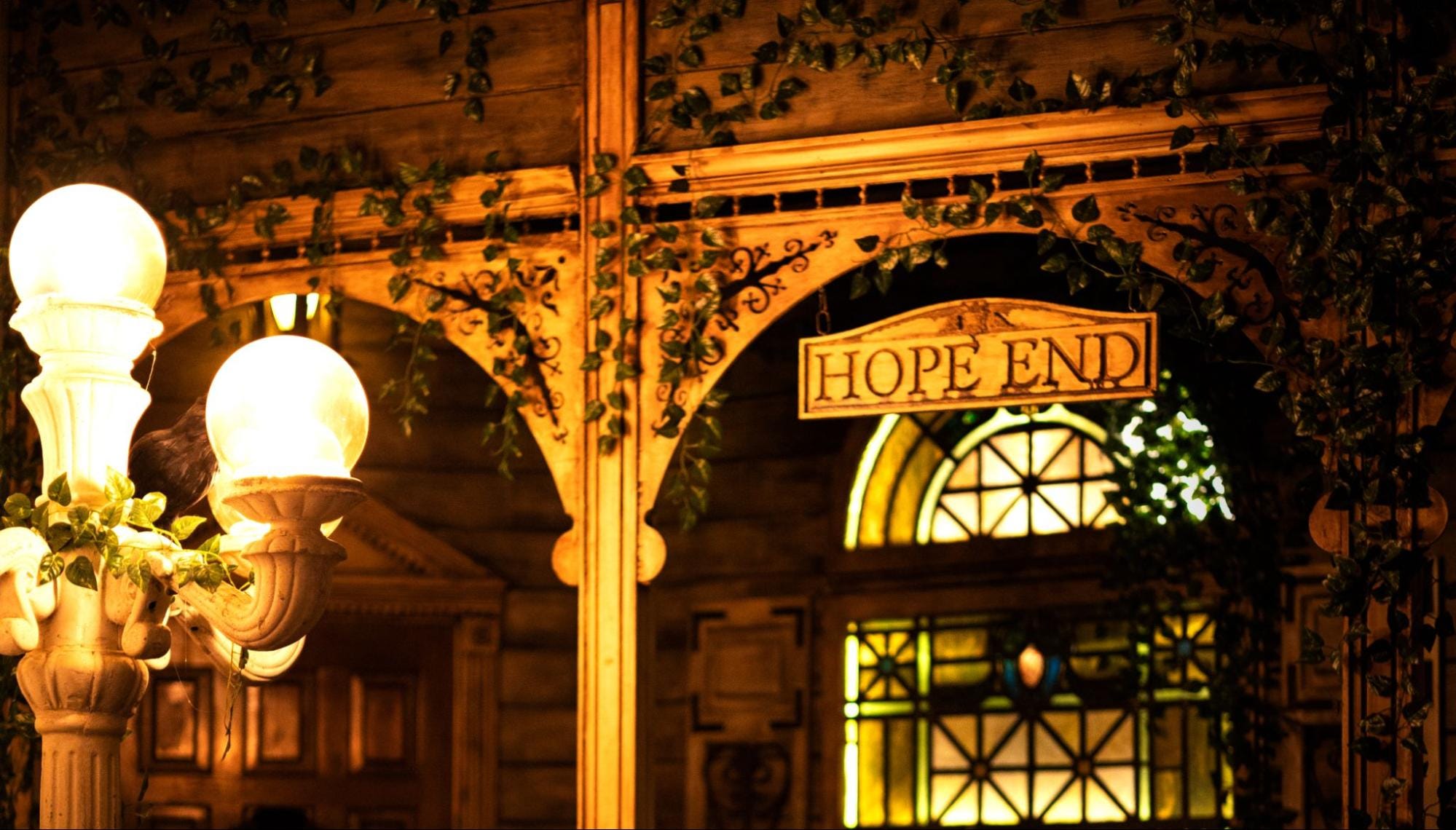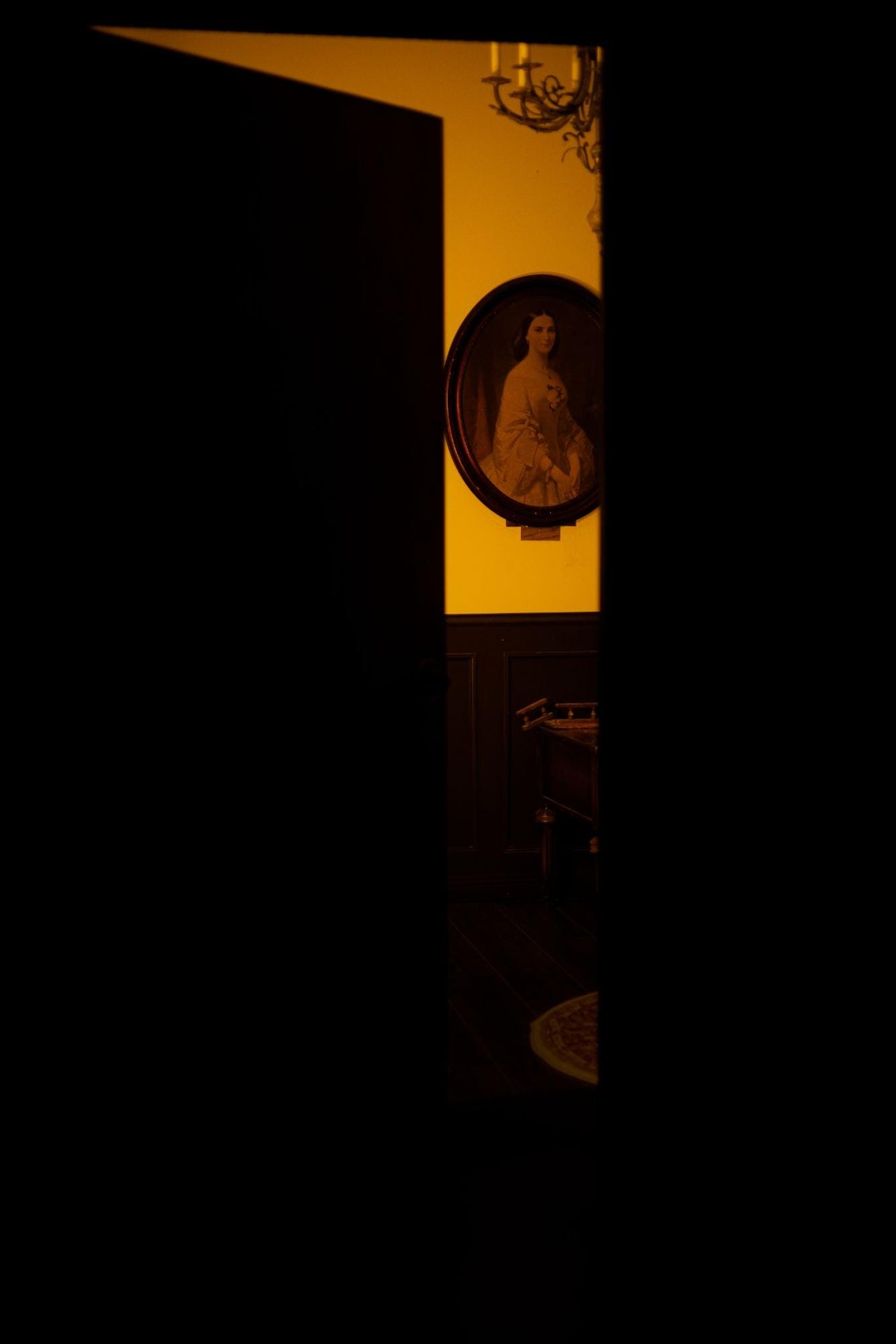Reveling in the Art of Mystery: ‘Hope End’ at The Ministry of Peculiarities (A NoPro Team Review)
The NoPro Review Crew unravels the tale at the heart of Southern California’s hottest escape game.


Tucked away in the corner of an unassuming strip mall in Azusa, CA, nestled into the shell of an old billiards club is one of Southern California’s, if not the country’s, most incredible immersive games. Born out of a love for both escape games and immersive theatre, The Ministry of Peculiarities’ Hope End blends the best of both fields into an experience that puts story front and center in a way that many designers strive for and few achieve.
What follows is a rare triptych review from the NoPro Review Crew, with Leah Davis focusing on the social dynamics of the experience and Laura Hess sharing her perspective as a first time, IRL escape game player.
But we’ll start with the story and performance aspects.
Getting to Know the Family — Noah Nelson
Guests are greeted as the latest recruits for the Ministry, whose mandate covers all manner of strange phenomenon. We’re quickly assigned to the vexing case of Hope End, a cursed house thanks to the most unfortunate deaths of the Wright family, who all passed away generations ago under mysterious circumstances.
This sort of setup may sound familiar to many an escape room goer, but the game’s execution sets it apart from the pack. The main difference is that the relationships between the characters has the feeling of what you might find in a soap opera, or at least a torrid Victorian page turner. The Wrights have dimension to them, and learning of the twisted web that links them all makes them feel like more than mere plot devices in a clockwork mystery. Hope End embodies this through the presence of a live actor, who set the stakes and the tone as we moved from the frame of “The Ministry” to the world of “Hope End” then carrying that theme forward via repeated appearances throughout the game.
Another bit of genius is how the puzzles and stories are indelibly interlinked. Piecing together clues reveals story, and understanding the character’s relationships to each other is a critical part of unraveling the mystery. Too often, mysteries — be they literary, cinematic, or games — forget to strike a balance between the sleuthing and the story, and here that trap is blissfully avoided by the design team. As we progressed it truly felt like we were organically uncovering the story.
While a time component still exists, the other element that differentiates Hope End from the majority of escape games is that an “escape” frame is missing. We are given so much time to uncover as much of the mystery as we can, and it is possible to leave some stones unturned without walking away unsatisfied. It’s quality over quantity all the way through, and that just might be the most refreshing part of this off-the-beaten-path adventure.
First Timer — Laura Hess, Arts Editor
I did it backwards.
I’ll explain: When the pandemic started, I leaned into digital, remote, and virtual productions. Pre-2020, I was an escape room novice; I mainly simmered in the stew of immersive theatre, installation art, and experiential marketing. When in-person events were eliminated, I added escape rooms to the menu.
Often playing with escape room experts, I found myself Zooming into productions in the US, UK, Netherlands, and Japan. Although I was developing a fluency in social interaction for video conferencing platforms, I had no frame of reference for the escape room discovery process.
My online teammates were sharp and intuitive, and I was keen to track their investigative skills. The remote format also demanded participatory cohesion. I couldn’t wander off to probe other spaces or inspect objects; I couldn’t choose to interact with a different performer. Our entire group was confined to the same view within our monitors and engaging with the same actor. Working together was a toggled, coordinated affair.
(Of the rooms I played, the exceptions were Jury Games productions, which leveraged breakout rooms and individual scenes with actors to stellar effect.)
This coordinated affair fostered unique delight in the simultaneous experience. Our different ways of thinking and varied puzzle-solving tactics compounded in real time and Aha! moments were collectively shared.
Then, after two-and-a-half years of Covid, I drove out to Azusa to The Ministry of Peculiarities for my very first in-person escape room: Hope End.
Our group stepped into The Ministry’s foyer and the immediacy of the tactile environment — and the freedom to explore it — captured me; my eyes and mind wandered as we were debriefed by a performer about the investigation into the Wright family’s mysterious deaths at their manor, Hope End.
The set design of the manor itself was compelling and detailed. After a poetic introduction by a different (and spooky!) performer, the experience branched and split our team into two chambers. From there, we were further separated, reunited, and funneled into additional spaces as we solved riddles and the narrative unfolded.
My particular path opened portals, while closing off certain reveals. The freedoms and constraints of the physical world felt both additive and subtractive. At times I found myself so thoroughly absorbed in private exploration that I missed clues and other happenings. This created a wonderful tension: Even before the full experience was over I longed to return for more discoveries. At the same time, I relished these intimate moments with performers, participants, and myself. In time, some of those private moments turned out to be impactful.
Once we segued into the final chamber, our group divided itself into smaller pods. I sat in a corner surveying the room. A small, carved box was on a table next to me and I opened it while still casting my focus across the room. The box’s contents were odd and also rather banal. Step-by-step, our team uncovered the morbid misery of the Wright family. Time passed. And then I overheard two people from our group mutter something about a substance needed to unlock that mystery. To their surprise, I exclaimed, “Oh that’s in the box!”
This kind of concurrent, isolated discovery offered by physical experiences isn’t broadly, automatically available for remote rooms. While remote shows cultivate a specific kind of communal pleasure, participants of in-person rooms can join together or operate independently in ways that are dynamic, fluid, and flexible, which is its own delicious experience. Hope End is so well crafted and brilliantly executed, it inspires the best effects from both types of productions: rich, communal pleasure and dynamic, intimate discovery.

Playing Together — Leah Davis, Senior Editor
The Ministry of Peculiarities is beautifully balanced. The game is a delight, but what really did it for me was how well-integrated everything was. The sets are lush and atmospheric (which is rare for an escape room; these things have to be able to take a beating); the acting invited us into the world without feeling forced; puzzle mechanics were intuitive but challenging; spacial audio cues cleverly kept things moving; and — somehow — the storyline was more than a thinly-veiled excuse for a bunch of “find the combination to this lock” challenges. I was invested! The Ministry of Peculiarities really said We’re going to do everything, and we’re going to do it well.
As a result, they’ve put together a game that’s going to appeal to a wide range of people. It’s something I noticed when our group went through: people naturally gravitated towards the things that interested them, and because the world is so rich, nobody gets left twiddling their thumbs. It starts as soon as you walk into the lobby. Ministry employees noticed one member of my group looking at a dusty shelf, and suddenly she was being put to work with a feather duster. I took two steps towards an old phone booth and was immediately told to try and see if I could figure out who was leaving “dream messages” for the agency. This is all part of the rules and onboarding process, but it’s also about setting experiential norms. We were being told (without being told) that each of us had a role to play, and that our individual interests would guide us along the way. It’s a theme we saw over and over throughout the game. I’m charmed thinking about it, and I’m still impressed by how player-driven those initial interactions were. I never felt like I was being railroaded into taking action. Instead, the actors created a virtuous loop: observing me, reacting to my organic explorations, and giving me space to respond in kind. It was glorious.
But what I really wanted to write about was how all this balance and integration informed our group dynamics. You know that thing that happens in escape rooms where everyone rushes in and tears the space apart, scrambling to contribute? It’s an escape room feeding frenzy, with people fighting for puzzle scraps. Yeah, that didn’t happen here. We had been primed in the lobby to explore things as individuals before coming together as a group. So when my group went through, we each found opportunities to engage deeply with our immersive feast. And because nobody felt rushed or starved, we really got to lean into emergent, cooperative play. That’s a fancy way of saying that my teammates and I took turns doing things together and letting each other take the spotlight along the way. This made solving the mystery that much more satisfying. Back in the lobby, I didn’t feel like we had brute-forced our way through some random game. I felt like we had lived a story together, and that’s something I’ve never felt after any other escape room.
A Final Note — Noah Nelson
Hope End currently stands as the one attraction the creative team behind the Ministry have running, but there are active plans for expansion. In addition, the team has been drafted by the Overlook Film Festival to craft an immersive component for the festival when it returns to New Orleans this coming spring. Yet right now the Ministry stands vigilant just off Route 66, and it’s our hope that more sleuths will heed the siren call of mystery out in Azuza.
The Ministry of Peculiarities’ Hope End books games Wednesdays through Sundays. Bookings start at $220 for a minimum of 4 players, with discounts for larger groups up to 12.